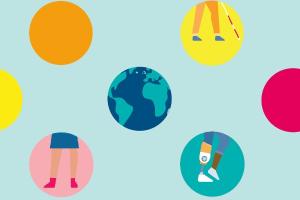The 2006 UN Convention on the Rights of Persons with Disabilities defines: "Persons with disabilities include those who have long-term physical, mental, intellectual or sensory impairments which, in interaction with various barriers, may prevent them from participating fully, effectively and equally in society." According to the Romanian Agency for the Rights of Persons with Disabilities (ANPDPD), around 860,000 Romanians were living with a recognised disability at the end of 2022. This corresponds to 3.9% of the population. However, in Romania, far from all those who would be entitled to it have their disability recognised. A World Bank study from 2021 estimates the actual percentage of people with disabilities in Romania at 4.7%. If the legal recognition were based on a broader concept of disability and if, for example, chronic pain, learning disabilities such as dyslexia or dysgraphia, or other limitations were also recognised as disabilities, the percentage of people with disabilities in Romania would be significantly higher.
Romanian law classifies disabilities according to medical criteria into several categories: physical, visual, auditory, deafblindness, somatic, intellectual, mental, HIV/AIDS and rare diseases. According to the ANPDPD quarterly bulletin, at the end of 2022, most people in Romania with a disability card had a physical (25%), somatic (20%) or mental (15%) disability. In terms of severity, there are several degrees in Romania: mild, moderate, severe and profound. As in most countries, the type and degree of disability is certified in a disability card in Romania. Romania also has a system for disability pensions, which can be claimed by people who have not yet reached retirement age but have lost all or part of their ability to work. In 2020, around 458,000 people received a disability pension.
The state's approach to disability points to this: In Romania, disabilities were long perceived as a "medical problem". This meant that a disability was primarily the problem of the individual concerned and, if necessary, of the relatives involved. Gradually, however, the discourse is shifting towards inclusion. More and more often the question is now: What barriers are there in Romanian society for a specific person to enjoy the same basic rights as everyone else and to participate actively in social life?
It raises awareness that almost everyone will most likely experience a (at least temporary) reduction in their abilities at some point in their lives. You only have to push a pram to notice the poor condition of Romanian pavements. A broken foot is enough to learn to appreciate accessible office space. Ability and disability lie on a continuum on which we all move. Accordingly, it is important to make infrastructure, services, products, but also the way we communicate, inclusive from the very beginning.
Digital innovation for more inclusion
Redesigning public space as well as office and residential space to be inclusive is a long-term process that will unfortunately take a long time in Romania. In other areas, however, remedial action can be taken more quickly. The Romanian tech tank "Code for Romania" (Code4.ro), which aims to solve or at least reduce social problems with the help of digital services, probably thought so too. The Code4.ro team makes its developments available to public institutions but also to civil society. Code4.ro has now spent several months working intensively on the question of how the inclusion of people with disabilities in Romania can be improved and how state support can be organised in a more efficient and accessible way.
"We are proud to now present our research report on equal opportunities for people with disabilities, developed within the Civic Labs programme. We want our work to make an important contribution to improving accessibility and quality of life for a large number of people. We have identified 25 digital solutions that can provide real and effective support to both people with disabilities and those around them, whether family, friends or people they interact with in education or at work. We want these solutions to be adopted and implemented as quickly as possible, helping to reduce stigma and create a society where all citizens are active and visible," says Olivia Vereha, Vice President of Product Development at Code4.ro/Commit Global.
Simplified application and digital disability card
A product of Code4.ro is a digital platform through which any person with a disability, their family members or carers can apply online for the disability card. The application procedure for disability cards is explained step by step, depending on the situation of the person with a disability (adult or child, initial application or renewal application). It is envisaged that each person making an application will be assigned a contact person who can advise in person via chat or on the phone if necessary. Documents can be uploaded online by the applicant as well as by the doctors and other professionals assessing him or her. The social survey, which is conducted by a social worker from the town hall, can be fed in digitally directly. When all documents have been uploaded, the case worker in charge can check the file and indicate whether further changes or additions to the documents are needed. The appointment for the assessment interview can also be made via the application. The result is communicated via the app and the steps to be followed in case of an appeal against the decision are also clearly explained. Other digital solutions are also heading in this direction: an app for interdisciplinary case management is intended to document the reports of supported living or working, community support services, medical services, social work, nursing, speech therapy, etc. and thus enable them to work together efficiently.
The advantages that Code4.ro highlights for the proposed digital applications show exactly what is not yet working in Romania today: Administrative processes are currently not yet clearly communicated; Responsibilities are opaque and it is difficult to find out which documents are needed for an application; There are unnecessary visits that are often particularly cumbersome for persons with disabilities; The progress of case processing is still often non-transparent and lengthy. It is quite simple: an efficiently functioning digital administration also contributes to inclusion.
Transparency in legal care
Some people with disabilities, especially those with intellectual or mental disabilities, require legal guardianship if they have no or limited legal capacity. Under this practice - still often known as "guardianship" in Romania - another person is appointed by the court as a legal guardian. The legal guardians make legally effective decisions for the person under their care and also manage their assets, for example.
The practice of annual reporting is a procedure whereby the legal guardian is obliged to send an annual report to the "guardianship authority" (rum. "Serviciul de Autoritate Tutelară", SAT) explaining how the income and assets of the person under guardianship have been used for their benefit. According to an analysis by the World Bank, in 2019, reports were submitted for only 39% of persons under legal care.
Code4.ro has now developed a digital application that provides a nationally standardised tool with predefined and measurable key indicators for the material situation, but also for the general wellbeing of persons under legal guardianship. The information can be used for monitoring by the guardianship authority and the aggregated data can also be viewed at the level of the central institutions. The module dedicated to the guardianship authorities should thereby also enable the entry of information from home visits.
More transparency in legal guardianship is an important step towards full implementation of the UN Convention on the Rights of Persons with Disabilities in Romania.
Lack of inclusion leads to lack of visibility
There are around 860,000 people with disabilities in Romania. Among them are about 75,000 children. However, you hardly ever see disabled people in everyday life: Neither on the street, nor at school, at work, on TV or in parliament. Code4.ro proposes digital applications such as guidelines for barrier-free accessibility of buildings, a guide for barrier-free digital products, applications for children with learning disabilities and their teachers, an app for learning sign language or an AI application for translating sign language. If one gets involved in digital approaches, a whole field of possibilities for greater inclusion of people with disabilities becomes apparent.
Not only are disabled people in Romania invisible in real life, but also in the data: There are not nearly enough studies on people with disabilities, their living conditions and needs. And the few studies that do exist are not precise enough. Moreover, existing data is neither aggregated nor systematically used at the central or local level. However, data is essential both for policy-making and for planning the provision of public, social and rehabilitation services. Code4.ro therefore proposes "Data Ally", a survey application. People with disabilities or their parents or legal guardians can create an account and provide their disability and other demographic information. Whenever an organisation needs information about the situation of people with disabilities in a certain geographical area, the registered persons are notified. The questionnaires will also be sent to GPs, social workers, community workers or specific NGOs that can help those who are not registered on the platform or do not know how to use the technology. It is hoped that this will also provide a better overview of the needs of people with disabilities in Romania in the medium term and thus promote inclusion.
Conclusion: Good ideas need political courage
In Romania, there are still major social challenges to overcome in order to achieve the inclusion of people with disabilities. Of course, the 25 digital project ideas presented by Code4.ro are not the only solutions. But one thing is clear: digital approaches can help to tackle very complex problems even with a limited budget. More decisive are the political will and the willingness to rely on innovation to create more inclusion. And then inclusion also needs the classic "good governance" to efficiently translate political decisions into administrative action. Let's go, Romania!






